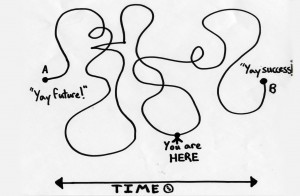Ah, fall. Sunburns give way to spray-tans that would make a bag of Cheetos jealous, the aging leaves have trouble hiding their yellows and try to cover them up with flaming reds, and indecisive Minnesota weather brings with it the intriguing sweatshirt/shorts/Uggs “fashion” statement. Somewhere, an alarm clock forcefully reminds a hangover that class started ten minutes ago, and another crop of students start freaking out about things like “futures,” “prospects” and the ever-elusive “job”. What a lovely time of year, really.
Autumn also tends to bring with it a touch of nostalgia. Maybe the visual evidence of another year ending serves to coax the mind into poorly lit alleys of old memories and whitewashed sentiment. As first-years begin to realize that they have absolutely no idea what they want to study for the next four-plus years and us seniors grapple with the notion that this time next year we’ll have to have real, adult-people jobs, it seems fitting that I should comment on what got me on my current academic track in the first place.

By senior year of high school, I had gone through enough theoretical career changes for a Cadillac dealership’s worth of midlife crises. Aspirations of being a rock star or an astronaut had gradually been streamlined by reality into research astronomer, microbiologist and eventually Japanese language translator. But nothing really grabbed me. I was much more confident about what I certainly did not want to pursue: anything to do with history (dates, of any variety, mystify me) or art (unless stick figures and peace sign doodles suddenly become piquant social commentary). But most of all, I would never, ever ever go into psychology.
Maybe it had something to do with my background. My family is peppered with scientists and mechanics and surgeons and other people whose jobs generally require a good deal of precision. Growing up, psychology was made out to be some vague sort of voodoo science, and only people who had a hefty serving of their own problems ever became psychologists. Because people only open laundromats when they have a bunch of their own dirty laundry to do, right?
As luck, fate, or voodoo science would have it, I was forced by a scheduling conflict to fill my last social science credit with, alas, Psychology. I was less than thrilled. If the energy it took to roll my eyes could be harnessed, I’m pretty sure I could have recharged my dead cell phone and sent numerous whiny, sarcastic text messages to my friends about how very less than thrilled I was.
But no one ever learns anything on the first day anyway, it’s all syllabi and rules and “Detention if you show up ten minutes late to class again, Chapman.” So the next day, I showed up on time and with a mind to learn. And through the tedium of textbook recitation and seemingly endless PowerPoint slides, a funny thing happened.
I can’t exactly pinpoint when reluctance and blatant skepticism began to morph into bemused interest and eventually full-on fascination. Nowadays, when I introduce myself to people, it’s usually something along the lines of “My name is Jenna and I’m a psych major, and no, I cannot read your mind, but I will occasionally analyze your personality when I get bored.” Okay, not really that last part. Point is, I have actually gotten to that point in my life where my career/area of study at least partially defines me, and I am totally okay with that. Other characteristics have stuck around for years without any substantial change: stage four music snobbery, questionable social skills, general nerditude and a functional addiction to laziness, to name a few. But a professional interest in the dissection of thought—that is something I honestly never thought would apply to me. Psychology turned out to be a window through which to view every other interest I had. How can we study music, language, classic literature, without understanding how we mentally perceive its significance? The brain has become my own “final frontier” of sorts, and I am thrilled to think that I will ride out my career exploring it.
So remember, first-years, it’s okay that you have no idea what your major is or what you want to do for the rest of your life. Sometimes, all it takes is one good class or an interesting book. Or maybe that volunteering gig you take up for sorority credit will make you realize you want to join the Peace Corps. Seniors, find something you love. If you don’t love anything yet, find something else. Even at the end of your tenure here, a semester can still take some surprising turns if you’re willing to give it the opportunity.